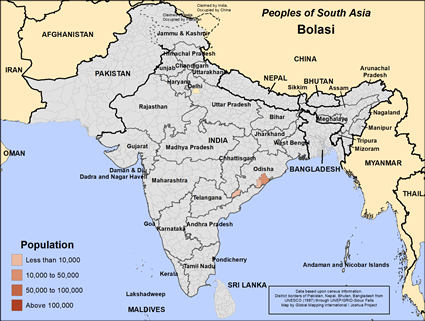Bolasi people have a long history in India, traditionally known for their roles as agriculturalists and traders. They lived in the northern regions of India for centuries. Today they live in Odisha and speak Odia, the language of that state.
Today, the Bolasi people primarily reside in rural villages, engaging in farming and small-scale trade. They cultivate crops such as wheat, rice, and vegetables and many families also rear livestock. Their communities are close-knit, with strong family bonds and mutual support. Despite economic challenges, the Bolasi maintain a vibrant cultural life, celebrating their heritage through local festivals, music, and traditional crafts.
The Bolasi people distinguish themselves from other groups through their expertise in agriculture and trade. Their deep knowledge of farming techniques and local commerce sets them apart from neighboring communities. The Bolasi place a strong emphasis on maintaining family unity.
Their wedding practices are elaborate and deeply rooted in Hindu tradition. Weddings typically include rituals such as the exchange of garlands, sacred fire ceremonies, and vibrant music and dance performances. These ceremonies highlight the importance of family, religion, and community.
The Bolasi's eating practices involve a diet primarily based on vegetarian food, including rice, lentils, vegetables and a variety of spices. They also enjoy traditional sweets and festive foods during celebrations. Their culinary practices emphasize simplicity, nutrition, and the use of locally available ingredients.
The Bolasi people practice Hinduism, worshiping various deities and observing numerous religious rituals and festivals such as Diwali, Holi, and Navratri. Their belief system emphasizes values like dharma (duty), karma (actions and consequences), and ahimsa (non-violence). They also honor their ancestors through rituals and ceremonies, ensuring the transmission of their religious and cultural traditions across generations.
The Bolasi people need better access to quality education to provide more opportunities for their children. Improved healthcare services are essential due to the limited availability of medical facilities and the high rates of preventable diseases. Economic support through modern agricultural techniques, market access, and vocational training can enhance their livelihoods. Infrastructure development, including better roads, clean water supplies, and reliable electricity, will greatly benefit the Bolasi community.
Pray for an abundant blessing of Bolasi families and communities as they embrace Jesus Christ, the Lord of lords.
Pray for a movement to Christ that will enrich the Bolasi community.
Pray for spiritual openness to Jesus Christ that will not be hindered by the false belief in religious institutions rather than the person, Jesus Christ.
Scripture Prayers for the Bolasi in India.
Agricultural Practices and Traditions in Northern India, Ministry of Agriculture, Government of India, 2017.
Sharma, B.K., "Cultural Heritage of Punjab and Haryana," Mittal Publications, 2013.
"Rural Development and Economic Practices in India,"
| Profile Source: Joshua Project |











